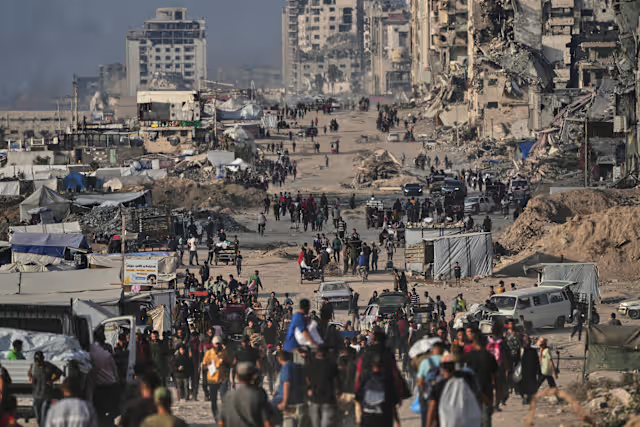Understanding the Crisis
The humanitarian situation in Gaza has reached alarming levels, with recent reports indicating that the region is on the brink of famine. The Integrated Food Security Phase Classification (IPC) has issued an urgent alert, highlighting the severe food insecurity that is affecting a significant portion of the population. As of late 2023, around 2.1 million people in Gaza require urgent assistance, with the situation deteriorating rapidly due to ongoing conflict and blockades.
The disruption of essential services has severely impacted food production and distribution networks. As a consequence, many families face extreme hardships in accessing sufficient and nutritious food. The World Food Programme has noted a staggering increase in the levels of malnutrition, particularly among vulnerable groups such as children and pregnant women. Reports suggest that nearly 1.5 million people are unable to consume the minimum number of calories required daily, leading to alarming rates of stunting and wasting among children under five years of age, which are directly linked to their health and cognitive development.
The declining food consumption patterns are further exacerbated by the economic constraints faced by residents, including soaring prices of basic commodities and loss of income due to the conflict. A significant percentage of households are resorting to negative coping mechanisms, such as selling assets, reducing meal sizes, or relying on humanitarian assistance. Additionally, the ongoing conflict has led to displacement and the destruction of homes, further straining the already scarce resources available for food security.
With food systems in Gaza on the verge of collapse, the time for immediate intervention is critical. Efforts must be coordinated to provide emergency food aid, restore agricultural activities, and ensure that humanitarian access is granted so that communities can regain stability. Without swift action, the situation is likely to worsen, resulting in devastating consequences for the people of Gaza and their future generations.
The Role of Humanitarian Aid
Humanitarian aid plays a crucial role in alleviating the suffering experienced by those in Gaza, a region currently facing an unprecedented humanitarian crisis. The phrase “the trickle of aid must become an ocean” encapsulates the urgent need for a substantial increase in the volume of assistance provided. In practical terms, this means that the aid response must significantly scale up to meet the overwhelming demands of the population. Currently, the level of support is grossly inadequate to address the dire circumstances that families are facing in accordance with the basic human rights to food, water, health, and security.
The types of aid required are diverse but essential. Firstly, food assistance is critical, as many families struggle to access basic nutrition. This necessitates not just immediate food parcels, but long-term support to ensure food security through sustainable means. Secondly, access to clean potable water is vital for survival, as waterborne diseases pose significant health risks in overcrowded conditions. Humanitarian efforts must prioritize the infrastructure needed for water purification and distribution to prevent further degradation of public health.
Medical supplies are another pressing requirement. Hospitals are overwhelmed, and many lack the fundamental resources necessary to treat injuries and illnesses. A well-coordinated effort is essential to provide medical aid, including essential medications and equipment. Lastly, fuel supplies must be ensured to enable the operation of generators and transport vehicles, which are integral for moving aid and maintaining public services amid extensive shortages.
Furthermore, the timely delivery of these resources is paramount; bureaucratic delays and obstacles must be minimized to facilitate rapid assistance. Coordinated international efforts and transparency in the distribution process can help maximize the impact of humanitarian relief initiatives. Immediate action is imperative—only through a significant scaling of aid efforts can the dire situation in Gaza begin to improve and the suffering of its people be mitigated.
The Path to Resolution
Addressing the crisis in Gaza requires a multifaceted approach that prioritizes both immediate human needs and long-term stability. UN Secretary-General António Guterres has called for an immediate and permanent humanitarian ceasefire, a critical first step in alleviating the dire conditions faced by civilians. A ceasefire would not only halt the ongoing violence but also create a conducive environment for the delivery of aid, allowing humanitarian organizations to reach those in need without the threat of conflict. The binding nature of such measures is essential, calling on all parties to commit to reducing hostilities and fostering peace.
Additionally, the unconditional release of hostages is paramount, as it addresses the humanitarian concerns of families and communities affected by the ongoing crisis. The return of these individuals would serve as a catalyst for rebuilding trust and initiating dialogues necessary for a more lasting resolution. Furthermore, the requirement for unrestricted humanitarian access to all parts of Gaza cannot be overstated. Currently, many regions remain cut off from essential supplies, including food, water, and medical services. Ensuring that aid reaches every corner of Gaza is crucial in preventing a famine that could exacerbate the already devastating humanitarian crisis.
The role of various stakeholders, including governments, international organizations, and non-governmental organizations (NGOs), is vital in this process. Collaborative efforts can amplify the impact of these measures, ensuring that humanitarian principles guide the distribution of aid and protection for vulnerable populations. Moreover, pressure must be exerted on parties involved to adhere to internationally recognized human rights standards. By committing to these immediate actions, stakeholders can pave the way for an effective resolution that prioritizes human life and dignity, fostering a more peaceful future for Gaza.
A Call for Collective Humanity
The ongoing crisis in Gaza serves as a poignant reminder of our collective responsibility as global citizens. The situation, marked by extreme scarcity of food, medical supplies, and basic necessities, transcends regional boundaries and becomes a pressing moral dilemma for humanity as a whole. The phrase “a test of our shared humanity” takes on profound significance in light of the suffering faced by countless individuals and families caught in this humanitarian emergency. It is not merely a local issue confined to the geographical borders of Gaza; it is a challenge that tests the ethical fibers of all societies.
As members of a global community, we must recognize the critical need for immediate action. The responsibility does not lie solely with governments or large organizations; each individual plays a pivotal role in promoting awareness and advocating for profound change. Small, yet impactful actions such as raising awareness on social media, educating others about the plight of the Gazan people, and engaging with relevant humanitarian organizations can collectively lead to significant outcomes. Each voice matters, contributing to a chorus that demands justice and assistance for those in dire need.
Beyond awareness, it is essential to support organizations working tirelessly on the ground to provide critical aid. Donations, whether monetary or supplies, can help alleviate the suffering of those in immediate need. Volunteering time with local or international humanitarian missions allows individuals to take direct action and contribute to relief efforts in a meaningful way. The invocation for collective humanity pushes us to step beyond mere apathy; it urges us to mobilize, to rally, and to advocate for those who may be voiceless in the face of adversity.
Ultimately, the plight of the people in Gaza is a call to our shared consciousness, challenging us to act with compassion and urgency. By engaging in this fight for human dignity, we reaffirm our commitment to a world where every individual’s right to life and sustenance is upheld. This is not just a matter of charity; it is a fundamental expression of our humanity that binds us together in our shared hope for a better future.

 from Africa, Asia and United Nations here for your comfort in different languages, but you can click on our translator in different languages on our Website.
from Africa, Asia and United Nations here for your comfort in different languages, but you can click on our translator in different languages on our Website.
